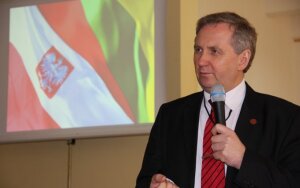- April 8, 2013
- 457
Wołkonowski: many students have problems with mathematics and Polish language

In the past 10 years, the number of educated Poles in Lithuania has increased – said the Dean of the Department of the University of Białystok in Vilnius, Jarosław Wołkonowski, in an interview with the “Upon Neris” (“Znad Wilii”) Radio. In spite of this fact, Poles are still the last but ones (the last ones are Romany people), as a group, on the list of people who have higher education – added the scientist.
“We can say that there is progress, since the last time we had 63 out of 1000 Poles living in Lithuania who have higher education. Now we have 138, but the national average has gone up from 126 to 212.” – said Wołkonowski.
In the Dean’s opinion the data can be inaccurate, since many young Poles study in Poland and they never go back to Lithuania. “And in this way, instead of a noble mission of rebuilding the Intelligentsia, which was ruined after the Second World War, we face the fact that the most talented young people disappear from the region” – explained Wołkonowski.
The majority of students are graduates of Polish schools in Lithuania, but many of them have problems with using their mother tongue in speech. “Many people have problems with mathematics and their mother tongue (…) They are graduates of Polish schools in Lithuania. Recently, the number of hours dedicated o Lithuanian language teaching was increased, and this obligation was often fulfilled at the price of Polish language teaching time. University candidates come to us, and they have major problems with writing their bachelor theses in Polish” – explained Jarosław Wołkonowski, the Dean of the Department on the University of Białystok in Vilnius.
Tłumaczenie Emilia Zawieracz w ramach praktyk w Europejskiej Fundacji Praw Człowieka, www.efhr.eu. Translated by Emilia Zawieracz within the framework of a traineeship programme of the European Foundation of Human Rights, www.efhr.eu.

